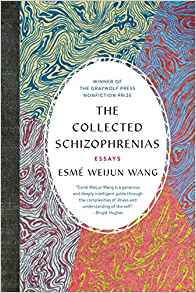After seeking help from numerous doctors and specialists, Esme Weijun Wang couldn’t shake the feeling that something was being missed. Finally, there was a breakthrough during her college years when she was first diagnosed as bipolar the summer before she left for New Haven. And then when her medical records were sent to Stanford she explains, “In the referral authorization itself, I was listed as having two diagnoses: schizoaffective disorder, bipolar type and idiopathic peripheral neuropathy. There was no mention of fibromyalgia, complex PTSD, dysautonomia/POTS, chronic Lyme disease, or any of the other diagnoses I’d received over the years” (185). Esme Weijun Wang’s 2019 essay collection The Collected Schizophrenias is an engaging journey that deals with a serious topic. The book does a thorough job of educating the reader in this area of health that is commonly misunderstood. The relationship between the author and the text is beautifully captured by including both clinical information and her own personal struggles and triumphs. Throughout the text, the relation of history, culture, and society at large is cut right to the core of the meaning of this collection of essays. History is brought in by the recollection of events that happen recently or in the past, such as “Slender Man” and “John Doe.” With the use of pop culture Wang shows the reader that movies and even Marvel comics portray mental illness incorrectly. Characters in films with mental illness are shown as either having superpowers like Legion or Lucy; or being possessed like the film The Exorcist. Neither scenario is correct. I believe Wang is saying that we have to remember that these characters in the movies aren’t real. We have to remember that the people around us “are real people and not robots; I am alive not dead” (128).
Wang also mentions her years at Yale. During this section of the book, she writes in a way that will leave you with the realization that even within a prestigious university, help is challenging to find. In "Yale Will Not Save You," Wang mentions, “It isn’t clear whether the officer was given crisis de-escalation training, or any kind of training at all in dealing with mentally ill students” (67). Also, Yale told her that she had to leave immediately because “psychiatric illness is punished by colleges and universities that instead ought to be accommodated students under the Americans with Disabilities Act (ADA). Rather than receiving help mentally ill students are frequently ordered to leave” (73). To Wang’s credit she found the personal strength to develop herself in other ways. Wang doesn’t share the year when she shared the ways she developed herself. The Collected Schizophrenias is not just a collection of essays; it is so much more. Wang inspires her audience by telling her story to mental health professionals at conferences and now in writing this collection of essays. She inspires and gives hope to those that struggle with these disorders. Her book is an honest letter to those who live with a mental disorder and also to those that love them.
0 Comments
Leave a Reply. |
Archives
July 2024
Categories
All
|
|
Glassworks is a publication of Rowan University's Master of Arts in Writing 260 Victoria Street • Glassboro, New Jersey 08028 [email protected] |
All Content on this Site (c) 2024 Glassworks
|


 RSS Feed
RSS Feed
